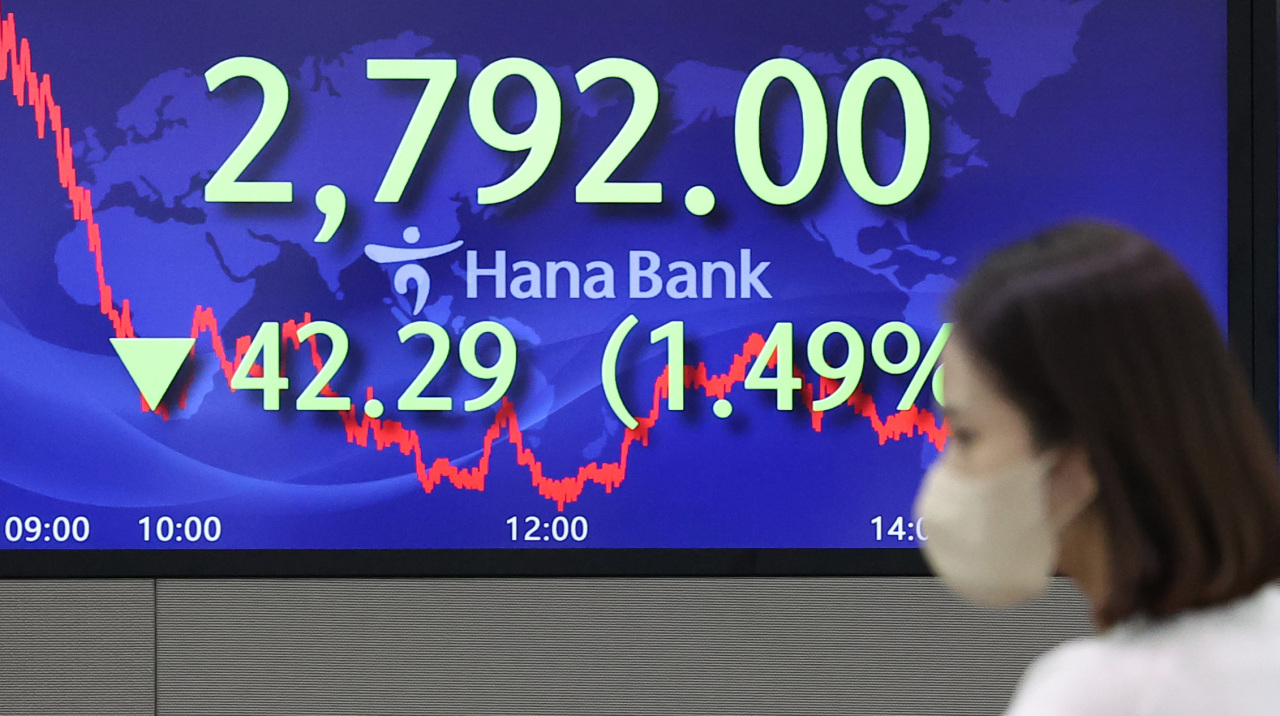Kospi hits 13-month low on US rate hike worries
Market concerns over ‘Korea discount’ reemerge as Kospi drops rapidly on foreign, retail sell-offs
By Choi Si-youngPublished : Jan. 24, 2022 - 17:09

Worries over the sooner-than-expected rate hike by the US led South Korea’s benchmark Kospi to dip below 2,800 Monday, a first since Dec. 23, 2020, when it closed at 2,759. The Kospi fell 42.29 points or 1.49 percent from Friday to close at 2,792, sparking concerns over a prolonged slump.
“Investors fear reduced liquidity. And the markets are catching up with the Fed, which has signaled two things: an earlier rate hike and tapering of the pandemic-era market support,” said Oh Tae-dong, head of research at NH Investment & Securities.
Oh said the local stock market would rebound from the rout as early as February, after a Federal Reserve meeting this week. The dip would hit tech stocks hardest, which ride on growth hopes rather than actual solid earnings, according to Oh.
“Tech companies doing digital businesses like the metaverse are the ones exposed to the impact. But their presence is low in South Korea and we have strong exports, which will offset a potential fall in that sector, if any,” Oh added.
Hwang Sei-woon, a senior research fellow at the Korea Capital Market Institute, said the sell-off marks a correction that comes once or twice a year in what is typically an average 20 percent drop from where it once stood highest. The Kospi hit a record high of 3,305 in July 2021.
“About 20 percent off that is 2,704, meaning the Kospi could tumble more. But it is all part of corrections we see every year and this time, the fall is a reflection of what investors are thinking of the Fed preparing for a rate hike followed by tapering asset purchases,” Hwang said.
Hwang noted the Kospi will head for a recovery in the second half this year after quantitative tightening –- which would cut purchases that doubled in size during the coronavirus pandemic –- kicks in around June at the earliest, three months after the Fed is expected to raise the rate for the first time this year.
The two experts were wary of calling the market shift evidence of the so-called “Korea discount,” a tendency to undervalue South Korean shares in comparison to global peers because of recurring market volatility, caused by heavy dependence on foreigners or by opaque governance of listed firms.
“Foreigners, including institutions, are the chief buyers, and that’s been a fact of life where retail investors track them to do their own bidding,” Hwang said.
Oh of NH Investment & Securities refused to see the recent market decline being associated with the notion, saying the US affects all markets around the world and that there was little data to say the local stock market in particular had performed poorly.
“Since the pandemic started in March 2020, the Kospi had performed just as well as the S&P 500, though profit margins could be a bit higher for the US index,” Oh said.
“Investors fear reduced liquidity. And the markets are catching up with the Fed, which has signaled two things: an earlier rate hike and tapering of the pandemic-era market support,” said Oh Tae-dong, head of research at NH Investment & Securities.
Oh said the local stock market would rebound from the rout as early as February, after a Federal Reserve meeting this week. The dip would hit tech stocks hardest, which ride on growth hopes rather than actual solid earnings, according to Oh.
“Tech companies doing digital businesses like the metaverse are the ones exposed to the impact. But their presence is low in South Korea and we have strong exports, which will offset a potential fall in that sector, if any,” Oh added.
Hwang Sei-woon, a senior research fellow at the Korea Capital Market Institute, said the sell-off marks a correction that comes once or twice a year in what is typically an average 20 percent drop from where it once stood highest. The Kospi hit a record high of 3,305 in July 2021.
“About 20 percent off that is 2,704, meaning the Kospi could tumble more. But it is all part of corrections we see every year and this time, the fall is a reflection of what investors are thinking of the Fed preparing for a rate hike followed by tapering asset purchases,” Hwang said.
Hwang noted the Kospi will head for a recovery in the second half this year after quantitative tightening –- which would cut purchases that doubled in size during the coronavirus pandemic –- kicks in around June at the earliest, three months after the Fed is expected to raise the rate for the first time this year.
The two experts were wary of calling the market shift evidence of the so-called “Korea discount,” a tendency to undervalue South Korean shares in comparison to global peers because of recurring market volatility, caused by heavy dependence on foreigners or by opaque governance of listed firms.
“Foreigners, including institutions, are the chief buyers, and that’s been a fact of life where retail investors track them to do their own bidding,” Hwang said.
Oh of NH Investment & Securities refused to see the recent market decline being associated with the notion, saying the US affects all markets around the world and that there was little data to say the local stock market in particular had performed poorly.
“Since the pandemic started in March 2020, the Kospi had performed just as well as the S&P 500, though profit margins could be a bit higher for the US index,” Oh said.
-
Articles by Choi Si-young







![[KH Explains] How should Korea adjust its trade defenses against Chinese EVs?](http://res.heraldm.com/phpwas/restmb_idxmake.php?idx=644&simg=/content/image/2024/04/15/20240415050562_0.jpg&u=20240415144419)











![[Today’s K-pop] Stray Kids to return soon: report](http://res.heraldm.com/phpwas/restmb_idxmake.php?idx=642&simg=/content/image/2024/04/16/20240416050713_0.jpg&u=)